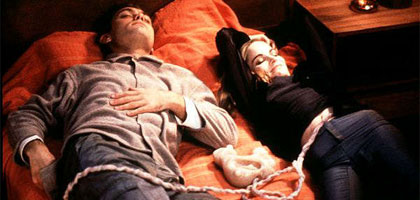
eXistenZ
Canada/UK 1999

Reviewed by Kevin Jackson
Synopsis
Our synopses give away the plot in full, including surprise twists.
North America, the near future. A group of players gather to try out eXistenZ, the latest brainchild of the games world's most notorious genius, Allegra Geller. eXistenz is an elaborate game in which the players wire themselves up via a bioport - a plug inserted in the spinal column - to a semi-organic game pod, to induce plotted hallucinations. However, as Allegra begins to download eXistenZ, an anti-games assassin opens fire on her.
Allegra is rescued by Ted Pikul, a junior company member. They set off on the run, pursued by bounty hunters, though Allegra is more concerned about her damaged game. She insists she and Ted must play eXistenZ to assess the damage. Initially fearful, Ted agrees finally to have a bootleg bioport shot into his spine by Gas, a roughneck garage man who turns out to be one of the enemy.
They flee to a ski resort where Allegra's colleague Kiri Vinokur replaces Ted's sabotaged bioport so the couple can finally plug in and play. Together, they enter a violent and frequently bloody set of narratives about spies, counterspies and assassins - a story which becomes increasingly confused with events in the outside world. Finally, it emerges that the entire action so far has itself been a game called transCendenZ; "Allegra", "Ted" and all the other men and women are merely players. "Allegra" and "Ted" are themselves the true anti-games terrorists. As the lethal couple corner transCendenZ's inventor Yevgeny Nourish, he asks them fearfully if this is only an episode in a still more inclusive game. They do not reply.
Review
Fairly or otherwise, two of the critical terms least frequently applied to the Cronenberg oeuvre thus far have been 'fun' and 'cute': a regrettable state of affairs that eXistenZ should do much to remedy. First, the fun part: notwithstanding its showstopping metaphysical somersaults between Chinese-boxed levels of reality, eXistenZ is in many respects an unexpectedly conventional entertainment. Some of the conventionality is due, we must assume, to the imaginative tastes of Allegra Geller (or, more pedantically, of the tranCenden-tal inventor of "Allegra Geller"), who may be a whiz at bio-tech confections but seems to enjoy an essentially rather banal, if lurid, fantasy life. On the evidence of her taste in adventures, Allegra must have spent her childhood gorging on B movies, Bond films, The Avengers and such like, and she's plainly not averse to rescripting herself from a barely articulate wallflower in real life into a devastatingly sexy action babe in eXistenZ life. Somehow, Jennifer Jason Leigh manages to make Allegra into a sympathetic and very nearly plausible character, the single fleshed-out (if that is the apposite term) human being in a gallery of ciphers and caricatures. It's quite a feat.
Next, the cute part. At one point, Allegra notices and smiles at a frisky little two-headed amphibian that wouldn't look out of place in a Disney confection. A few years ago, the Independent asked its readers to nominate the least likely combination of director and subject. The winning entry was: "David Cronenberg's National Velvet". Maybe that competition came to the director's notice, and gave him some ideas. Rest assured, the wee beastie meets a literally sticky end, for in most other respects eXistenZ is something of a resumé or, less kindly, a puree of just about every previous Cronenberg film, from the mournfully dignified score by Howard Shore to the sombre lighting and preposterous names. Among its equally familiar attractions are furtive visits to the House of Fiction (cf. Naked Lunch), a dangerously seductive new form of entertainment (Videodrome, the most obvious precursor of eXistenZ), crossings of the borderline between biology and technology (Crash and so on), lashings of erotic body modifications (Rabid and so on) and, of course, a generous portion of the old Cronenbergian red glop.
The red-glop factor is at its highest within the eXistenZ world, particularly when the twists and turns of the game's plot land Allegra and Ted as labourers in a low-rent abattoir-cum-laboratory, where grubby workers hack up frogs and lizards for biotechnological ends, and take their lunch-breaks in a nightmarish Chinese restaurant. Here, Ted orders the daily special, chomps his way through the unidentifiable slippery, slimy horrors he's served, uses the leftover bone and gristle to construct a gun which fires teeth (the very weapon used on Allegra at the beginning) and murders the waiter with a well-aimed molar. At a guess, this is the point of Cronenberg's film at which a lot of younger viewers will find themselves thinking it might be worth saving up for a bioport implant.
But the same qualities which make eXistenZ potent for games-world addicts make eXistenZ inadequately satisfying for those of us who go in for less all-absorbing forms of diversion, like the cinema. As a thrill-ride in its own right, eXistenZ is fine - it's slick, swift and droll. But as an anxious entertainment, which is meant to nag and gnaw at our hunger for surrendering ourselves to surrogate thrills, especially of the disreputable kind that last about two hours (for what, the film keeps nudging us, is eXistenZ if not a hyper-real story, and what is Allegra but a Künstler with the Gesamtkunstwerk to trump them all?), it's more than a touch half-baked.
eXistenZ tries to make our flesh creep with the insinuation that many of us, if we weren't deterred by the prospect of spinal surgery, would cheerfully invest in bioports and drift away into other people's fantasies. It does its dutiful best to make that Huxleyan thought appear guilty and disquieting. But cheerfulness, or its nastier Cronenbergian equivalent, keeps breaking through the gloom, and the very qualities which make eXistenZ watchable also make eXistenZ seem like unthreatening fun. Cronenberg has said the film's point of departure was an interview he once did with Salman Rushdie, but as Kim Newman has pointed out elsewhere in these pages, its more compelling literary source is the haunted fiction of Philip K. Dick. Compared to Dick's writing at its ontologically insecure best, though, eXistenZ looks as trifling as it is diverting: a little too perky, a little too pat.
Credits
- Producers
- Robert Lantos
- András Hámori
- David Cronenberg
- Screenplay
- David Cronenberg
- Director of Photography
- Peter Suschitzky
- Editor
- Ronald Sanders
- Production Designer
- Carol Spier
- Music/Music Conductor/Orchestrations
- Howard Shore
- ©Screenventures XXIV Productions Ltd.
- an Alliance Atlantis company
- and Existence Productions Limited
- Production Companies
- Alliance Atlantis and Serendipity Point Films present in association with Natural Nylon a Robert Lantos production
- Produced with the participation of Telefilm Canada/Canadian Television Fund
- Created by the Government of Canada and the Canadian Cable Industry CTF: License Fee program/The Canadian Film or Video Production Tax Credit/The Movie Network and The Harold Greenberg Fund/Le Fonds Harold Greenberg
- Co-producers
- Michael MacDonald
- Damon Bryant
- Bradley Adams
- Associate Producer
- Sandra Tucker
- Heads of Production
- Alliance Atlantis:
- Lacia Kornylo
- Natural Nylon:
- Tracey Seward
- Production Co-ordinators
- Elizabeth Senyi-Potechin
- Natural Nylon:
- Kitty Stanbrook
- Production Manager
- Michael MacDonald
- Location Manager
- Debra Beers
- Post-production Supervisor
- Lori Waters
- Assistant Directors
- Walter Gasparovic
- Penny Charter
- Kirsteen McLean
- Cassandra Cronenberg
- Script Supervisor
- Dug Rotstein
- Casting
- Deirdre Bowen
- Camera Operator
- Peter Suschitzky
- Digital Visual Effects
- Toybox, Toronto
- Visual Effects Supervisor:
- Dennis Berardi
- Visual Effects Co-ordinator:
- Josa Leah Porter
- Executive Producer:
- Andy Sykes
- Lead 3D Animator - Creature:
- Jim Rutherford
- 3D Animators:
- Raymond Gieringer
- Derek Grime
- Mike Manza
- Jesh Murthy
- Ralph Sevazlian
- Digital Effects Compositors:
- Alex Boothby
- Jeff Campbell
- Mark Goldberg
- Rob Gyorgy
- Paul Rigg
- Additional Scanning:
- Ken Elliott
- Digital Film Supervisor:
- Mike Ellis
- Motion Control
- Toybox, Toronto
- Motion Control Specialist:
- Jerry Andrews
- Motion Control Producer:
- Mike Ellis
- Camera Operator:
- Shawn Maher
- Motion Control Supervisor:
- Tony Willis
- Production Co-ordinator:
- Emily Wong
- Visual/Special Effects Supervisor
- Jim Isaac
- Art Director
- Tamara Deverell
- Set Decorator
- Elinor Rose Galbraith
- Key Scenic Artist
- John Bannister
- Scenic Artists
- Janet Cormack
- Doug Rennie
- Scott Donais
- Bradley McInnis
- Mila Rolicz
- Carole Lord
- Costume Designer
- Denise Cronenberg
- Costume Supervisor
- Brenda Gilles
- Make-up
- Artist:
- Shonagh Jabour
- Special Make-up/Creature Designer
- Stephan Dupuis
- Creature Effects Supervisor
- Kelly Lepkowsky
- Special Effects/Creature Effects Technicians
- Dennis Pawlik
- Ryan Nicholson
- Frances James
- Tim Lidstone
- Alisa Brooks
- Alex Laverick
- Serge Lavigueur
- Evan Penny
- Brandon Cronenberg
- Sean Sansom
- Damon Bishop
- John Jackson
- Jim Reischl
- Patrice Jacques
- David Loveday
- Jay McClennen
- Patrick Tenascon
- Floor Effects
- Michael Kavanaugh
- Warren Appleby
- Daniel White
- Hair Stylists
- Mary Lou Green
- Réjean Goderre
- Opening Title Design
- Cuppa Coffee Animation Inc, Toronto
- Executive Producer:
- Adam Shaheen
- Designer:
- Rob Pilichowski
- Assistant Designer:
- Margaret Lee
- Producer:
- Marlene Schmidt
- Compositor:
- John Coldrick
- AXYZ
- End Credits
- Film Effects Inc.
- Theremin
- Lydia Kavina
- Music Editors
- Suzana Peric
- Dan Evans Farkas
- Associate:
- Nancy Allen
- Recording Engineer
- Dick Lewzey
- Synclavier Programmer
- Robert Cotnoir
- Auricle Operator
- Chris Cozens
- Mixer
- Howard Shore
- Technical Consultant
- Bruce Buchanan
- Sound Mixer
- Glen Gauthier
- Re-recording Mixers
- Ray Merrin
- Graham Daniel
- Supervising Dialogue Editor
- Wayne Griffin
- Dialogue Editors
- John Laing
- Mark Gingras
- Supervising Effects Editor
- David Evans
- Effects Editors
- Tom Bjelic
- Paul Shikata
- ADR
- Recordist:
- Eric Apps
- Mixer:
- Ed Colyer
- Editor:
- Mark Gingras
- Foley
- Artists:
- Andy Malcolm
- Goro Koyama
- Mixers:
- Tony Van Den Akker
- Ron Mellegers
- Stunt Co-ordinator
- Alison Reid
- Gun Wrangler
- John 'Frenchie' Berger
- Animal Wrangler
- Jane Conway
- Cast
- Jennifer Jason Leigh
- Allegra Geller
- Jude Law
- Ted Pikul
- Ian Holm
- Kiri Vinokur
- Don McKellar
- Yevgeny Nourish
- Callum Keith Rennie
- Hugo Carlaw
- Sarah Polley
- Merle
- Robert A. Silverman
- D'Arcy Nader
- Christopher Eccleston
- Levi, seminar leader
- Willem Dafoe
- Gas
- Oscar Hsu
- Chinese waiter
- Kris Lemche
- Noel Dichter
- Vik Sahay
- male assistant
- Kirsten Johnson
- female assistant
- James Kirchner
- Landry
- Balazs Koos
- male volunteer
- Stephanie Belding
- female volunteer
- Gerry Quigley
- trout farm worker
- Certificate
- 15
- Distributor
- Alliance Releasing (UK)
- 8,717 feet
- 96 minutes 51 seconds
- Dolby digital
- Colour by
- DeLuxe Toronto
